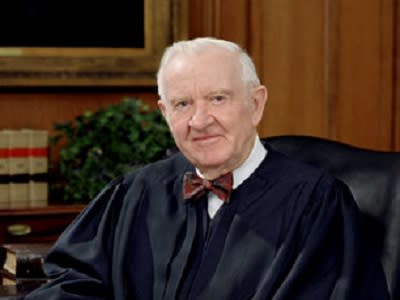Four early major Supreme Court decisions about the Internet
On the World Wide Web’s 25th birthday, Constitution Daily looks back at four Supreme Court decisions from the early Internet that laid the groundwork for free speech and responsible usage.

Reno v. American Civil Liberties Union (1997)
The Reno decision was an early First Amendment test of the Internet, and about the controversy over indecent and obscene materials posted on the World Wide Web.
Congress passed the Communications Decency Act of 1996 (or CDA) and it was signed into law by President Bill Clinton. But two sections of the Act were immediately challenged in court.
One provision of the CDA sought to protect minors by criminalizing the “knowing” transmission of “obscene or indecent” messages to any recipient under 18 years of age. Another provision prohibited the “knowin[g]” sending or displaying to a person under 18 of any message “that, in context, depicts or describes, in terms patently offensive as measured by contemporary community standards, sexual or excretory activities or organs.”
A unanimous Supreme Court invalidated these provisions. Justice John Paul Stevens, in the Court’s opinion, said the CDA’s “indecent transmission” and “patently offensive display” provisions abridged “the freedom of speech” protected by the First Amendment. The Court found that the two provisions were a content-based blanket restriction of free speech.
And importantly, the Court didn’t ruled on the legal “safe harbor” principle that Internet Service Providers were protected from the conduct of customers.
“Through the use of chat rooms, any person with a phone line can become a town crier with a voice that resonates farther than it could from any soapbox,” Stevens wrote. “The same individual can become a pamphleteer.” Stevens also argued that the diversity of Internet technology made it practically impossible for a user to encounter content by accident.
Ashcroft v. American Civil Liberties Union (2002) and Ashcroft v. Free Speech Coalition (2002)
In Ashcroft v. Free Speech Coalition, the Supreme Court struck down two parts of the Child Pornography Prevention Act of 1996, saying they were overbroad and unconstitutional.
Justice Anthony Kennedy, in the 6-3 decision, said the provisions weren’t in line with two earlier Supreme Court decisions and they abridged “the freedom to engage in a substantial amount of lawful speech.”
The first decision in Ashcroft v. American Civil Liberties Union came several weeks later and it was about the Child Online Protection Act of 1998. The Supreme Court had to decide if the use of “community standards” to identify “material that is harmful to minors” violated the First Amendment.
In a 8-1 decision, Justice Clarence Thomas said that while the act’s reliance on community standards didn’t by itself render the statute substantially overbroad for purposes of the First Amendment, the case had to be returned to the Third Circuit court for more review. The case returned to the Supreme Court two years later and Justice Anthony Kennedy wrote for a divided 5-3 court, saying there were “less restrictive alternatives to the statute.”
U.S. v. American Library Association (2003)
This case was about the Children’s Internet Protection Act (CIPA), passed in 2000 by Congress. It required public libraries to install Internet filtering software on their computers in order to qualify for federal funding.
In a 6-3 decision, Chief Justice William H. Rehnquist said that public libraries’ use of Internet filtering software didn’t violate their patrons’ First Amendment rights.
“The statute contains an important exception that limits the speech-related harm: It allows libraries to permit any adult patron access to an “overblocked” Web site or to disable the software filter entirely upon request,” Rehnquist said. “Given the comparatively small burden imposed upon library patrons seeking legitimate Internet materials, it cannot be said that any speech-related harm that the statute may cause is disproportionate when considered in relation to the statute’s legitimate objectives.”
Recent Constitution Daily History Stories
Can you pass a basic 10-question quiz on the presidents?
The 14th Amendment’s tortuous relationship with American Indians
The story of the wildest party in White House history
After 25 years, are we better off constitutionally with the Internet?

